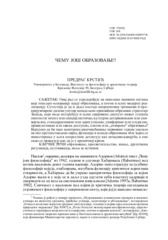Čemu još obrazovanje?
Апстракт
Овај рад се усредсређује на неколико наивних питања која темељно оспоравају идеју образовања, а потом и њену модерну реализацију. Сугестија је да и даље постоје непропитани трошкови и прокријумчарене дилеме унутар неподељено прихваћене образовне стратегије Запада, који онда оптерећују и њене савремене диспуте нижег степена општости: опште или специјалистичко, културно детерминисано или универзално, стандардизовано или дерегулисано, униформно или плурално, привилеговано или свима доступно, елитно или „отворено” образовање? Верујемо да би тако заоштрено рашчишћавање појмовног терена указало на оне претпостављене сврхе, функције и исходе образовања због којих се инвестирање у њега непрестано детектује као незадовољавајуће, а оно само се приказује као да је у хроничној кризи.
This paper focuses on a few simple questions that fundamentally challenge the idea of education, as well as its modern realization. The suggestion is that, within the undividedly accepted educational strategy of the West, there are still uninspected costs and smuggled dilemmas. They then burden the contemporary disputes over education at a lower level of generality: general or vocational, culturally determined or universal, standardized or deregulated, uniform or plural, privileged or available to all, elite or “open” education, and so on. We believe that such thorough clearing up of conceptual field would point to those presumed purposes, functions, and outcomes of education which make its investments seem constantly unsatisfactory, and education itself appears chronically in crisis.
Кључне речи:
образовање / education / просветитељство / знање / друштвена регулација / култивација / воља за истином / enlightenment / knowledge / social control / cultivation / will to truthИзвор:
Zbornik Matice srpske za društvene nauke, 2014, 149, 977-989Финансирање / пројекти:
- Истраживање климатских промена и њиховог утицаја на животну средину - праћење утицаја, адаптација и ублажавање (RS-MESTD-Integrated and Interdisciplinary Research (IIR or III)-43007)
Колекције
Институција/група
IFDTTY - JOUR AU - Krstić, Predrag PY - 2014 UR - file:///C:/Users/pc2012/Desktop/ZMSDN_149.pdf UR - http://rifdt.instifdt.bg.ac.rs/123456789/1585 AB - Овај рад се усредсређује на неколико наивних питања која темељно оспоравају идеју образовања, а потом и њену модерну реализацију. Сугестија је да и даље постоје непропитани трошкови и прокријумчарене дилеме унутар неподељено прихваћене образовне стратегије Запада, који онда оптерећују и њене савремене диспуте нижег степена општости: опште или специјалистичко, културно детерминисано или универзално, стандардизовано или дерегулисано, униформно или плурално, привилеговано или свима доступно, елитно или „отворено” образовање? Верујемо да би тако заоштрено рашчишћавање појмовног терена указало на оне претпостављене сврхе, функције и исходе образовања због којих се инвестирање у њега непрестано детектује као незадовољавајуће, а оно само се приказује као да је у хроничној кризи. AB - This paper focuses on a few simple questions that fundamentally challenge the idea of education, as well as its modern realization. The suggestion is that, within the undividedly accepted educational strategy of the West, there are still uninspected costs and smuggled dilemmas. They then burden the contemporary disputes over education at a lower level of generality: general or vocational, culturally determined or universal, standardized or deregulated, uniform or plural, privileged or available to all, elite or “open” education, and so on. We believe that such thorough clearing up of conceptual field would point to those presumed purposes, functions, and outcomes of education which make its investments seem constantly unsatisfactory, and education itself appears chronically in crisis. T2 - Zbornik Matice srpske za društvene nauke T1 - Čemu još obrazovanje? IS - 149 SP - 977 EP - 989 DO - 10.2298/ZMSDN1449977K ER -
@article{
author = "Krstić, Predrag",
year = "2014",
abstract = "Овај рад се усредсређује на неколико наивних питања која темељно оспоравају идеју образовања, а потом и њену модерну реализацију. Сугестија је да и даље постоје непропитани трошкови и прокријумчарене дилеме унутар неподељено прихваћене образовне стратегије Запада, који онда оптерећују и њене савремене диспуте нижег степена општости: опште или специјалистичко, културно детерминисано или универзално, стандардизовано или дерегулисано, униформно или плурално, привилеговано или свима доступно, елитно или „отворено” образовање? Верујемо да би тако заоштрено рашчишћавање појмовног терена указало на оне претпостављене сврхе, функције и исходе образовања због којих се инвестирање у њега непрестано детектује као незадовољавајуће, а оно само се приказује као да је у хроничној кризи., This paper focuses on a few simple questions that fundamentally challenge the idea of education, as well as its modern realization. The suggestion is that, within the undividedly accepted educational strategy of the West, there are still uninspected costs and smuggled dilemmas. They then burden the contemporary disputes over education at a lower level of generality: general or vocational, culturally determined or universal, standardized or deregulated, uniform or plural, privileged or available to all, elite or “open” education, and so on. We believe that such thorough clearing up of conceptual field would point to those presumed purposes, functions, and outcomes of education which make its investments seem constantly unsatisfactory, and education itself appears chronically in crisis.",
journal = "Zbornik Matice srpske za društvene nauke",
title = "Čemu još obrazovanje?",
number = "149",
pages = "977-989",
doi = "10.2298/ZMSDN1449977K"
}
Krstić, P.. (2014). Čemu još obrazovanje?. in Zbornik Matice srpske za društvene nauke(149), 977-989. https://doi.org/10.2298/ZMSDN1449977K
Krstić P. Čemu još obrazovanje?. in Zbornik Matice srpske za društvene nauke. 2014;(149):977-989. doi:10.2298/ZMSDN1449977K .
Krstić, Predrag, "Čemu još obrazovanje?" in Zbornik Matice srpske za društvene nauke, no. 149 (2014):977-989, https://doi.org/10.2298/ZMSDN1449977K . .


